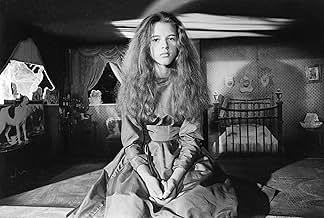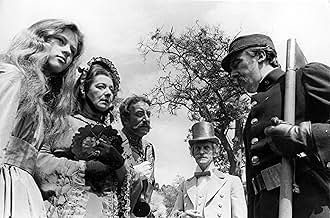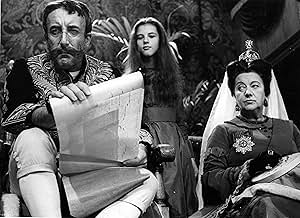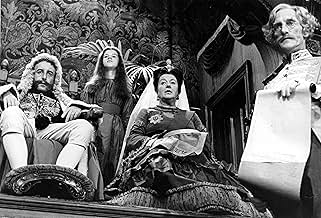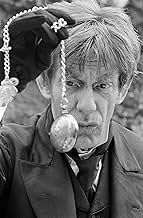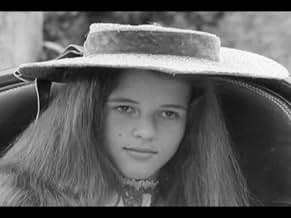IMDb RATING
6.7/10
1.1K
YOUR RATING
A girl named Alice falls down a rabbit-hole and wanders into the strange Wonderland.A girl named Alice falls down a rabbit-hole and wanders into the strange Wonderland.A girl named Alice falls down a rabbit-hole and wanders into the strange Wonderland.
- Director
- Writers
- Stars
Jo Maxwell Muller
- Alice's Sister
- (as Jo Maxwell-Muller)
Michael Redgrave
- Caterpillar
- (as Sir Michael Redgrave)
Anthony Trent
- Fish Footman
- (as Tony Trent)
- …
Wilfrid Lawson
- Dormouse
- (as Wilfred Lawson)
- Director
- Writers
- All cast & crew
- Production, box office & more at IMDbPro
6.71.1K
1
2
3
4
5
6
7
8
9
10
Featured reviews
One of a kind Alice
I'm not sure I completely buy Jonathan Miller's account of the book, but his interpretation (as he explains it on the commentary track) is pretty wonderful on balance. It's funny, surprising, beautiful and mostly about the nature of dreams. The cast, for fans of British movies and TV of the period, may have never been equaled. There's one from "Help", there's one from "A Hard Day's Night", there's the midget from "The Prisoner!" Wonderful. The only real question is "Where's Dudley Moore?" At any rate, I just found out about this movie, it's only been out on DVD for a year or two but it's one I think I will always treasure.
Lazing on a sunny afternoon in the summertime in 1862/1966
First time I saw this was on December 28th 1966 which was its first broadcast on BBC1, the next time was exactly 42 years later on a pristine BFI DVD. I was worried my childhood memories might be shattered by discovering it was simply a trippy '60's cop-out, but I needn't have been. Sure, it's a product of its time same as everything is, but it was and remains a unique filming of the classic tale by Lewis Carroll and imho the best version made so far.
Young Alice is transported by dream one sunny summer day to Wonderland where many adventures befall her. Whether Carroll was attracted or not to little girls ("I like all children, except boys") and whether that explains why his diaries had some ripped out pages at key moments is something we'll never know for sure now - I think he was merely a repressed idealist but he created a timeless story for children of all ages. His 90 page painstakingly hand written original edition which he gave to Alice in 1864 as "a Christmas gift to a dear child in memory of a summer day" is currently online from the British Museum and well worth a read.
Jonathan Miller's erudite sharp focus black and white production assumed that it was really meant for satirical adults, however it still managed to impress this particular 7 year old and especially his 5 year old wife to be and their counterparts 42 years later. Favourite bits: Michael Redgrave as the Caterpillar and John Geilgud as the Mock Turtle; Alice's walk with Duchess Leo McKern down the path through the woods followed by the camera crew weaving in and out of the trees and forward and backward; almost every scene has something of note though. Maybe I could have done with a bit more of Ravi Shankar's exceptional tunes but no worries. It's a pity John Bird's and Peter Sellers' post Goon Show improvisations were left in - it's no good Miller saying it was in the spirit of Carroll when their obvious inspiration was Spike Milligan, just one eg from 1954's Dreaded Batter Pudding Hurler Of Bexhill On Sea: "Suddenly! Nothing happened! But it happened suddenly mark you!" And I still wonder how much the production influenced the Beatles with their image for 1967? Apparently the finished film was considered too long by the BBC and 30 minutes were chopped off. Off with their heads - all those potential Pinteresque moments lost!
This is something to treasure: an arty BBC film that was genuinely arty, entertaining and still eminently watchable generations later. It almost managed to capture the illusive illusionary qualities of dreams and those seemingly beautifully languid sunny days of the '60's both 19th and 20th century.
Young Alice is transported by dream one sunny summer day to Wonderland where many adventures befall her. Whether Carroll was attracted or not to little girls ("I like all children, except boys") and whether that explains why his diaries had some ripped out pages at key moments is something we'll never know for sure now - I think he was merely a repressed idealist but he created a timeless story for children of all ages. His 90 page painstakingly hand written original edition which he gave to Alice in 1864 as "a Christmas gift to a dear child in memory of a summer day" is currently online from the British Museum and well worth a read.
Jonathan Miller's erudite sharp focus black and white production assumed that it was really meant for satirical adults, however it still managed to impress this particular 7 year old and especially his 5 year old wife to be and their counterparts 42 years later. Favourite bits: Michael Redgrave as the Caterpillar and John Geilgud as the Mock Turtle; Alice's walk with Duchess Leo McKern down the path through the woods followed by the camera crew weaving in and out of the trees and forward and backward; almost every scene has something of note though. Maybe I could have done with a bit more of Ravi Shankar's exceptional tunes but no worries. It's a pity John Bird's and Peter Sellers' post Goon Show improvisations were left in - it's no good Miller saying it was in the spirit of Carroll when their obvious inspiration was Spike Milligan, just one eg from 1954's Dreaded Batter Pudding Hurler Of Bexhill On Sea: "Suddenly! Nothing happened! But it happened suddenly mark you!" And I still wonder how much the production influenced the Beatles with their image for 1967? Apparently the finished film was considered too long by the BBC and 30 minutes were chopped off. Off with their heads - all those potential Pinteresque moments lost!
This is something to treasure: an arty BBC film that was genuinely arty, entertaining and still eminently watchable generations later. It almost managed to capture the illusive illusionary qualities of dreams and those seemingly beautifully languid sunny days of the '60's both 19th and 20th century.
Bizarre
Working with a shoestring budget director Jonathan Miller was able to persuade an impressive cast (Peter Sellers, Sir Michael Redgrave, Sir John Gielgud, Peter Cook, Alan Bennett, Michael Gough, Wilfred Brambell, Wilfred Lawson, Leo McKern, Malcolm Muggeridge, Finlay Currie) to make cameo appearances in his BBC production of "Alice in Wonderland". The results are mixed, with some bright spots (especially the few improvisations Miller left in).
Miller dresses his cast like Victorians, rather than making them look like animals (after all, he says in his commentary, the typical way of doing Alice is to take big stars and then cover them up with animal heads so you can't see who they are).
He takes the book literally. For instance, the Hatter and the March Hare are mad in a real way rather than the typically overblown cartoonish way. Peter Cook's Hatter is soft-spoken, laughing and agreeable, his lines always sounding like non sequiturs; while Michael Gough's March Hare is defensive, suspicious, and genuinely troubling.
The best scene, which probably best captures what Miller was working for, was Muggeridge's Gryphon and Gielgud's Mock Turtle. The fey White Rabbit of Wilfred Brambell ("A Hard Day's Night") is a delight. Peter Sellers, appearing all too briefly, has an amusing bit of business (Miller in his commentary doesn't like it but it suits the scene admirably and in this case Sellers the slapstick authority knew what he was doing better than the director -- the scene cries out for what he does). Michael Redgrave is phenomenal in his all-too-brief turn as the caterpillar, but the scene is damaged by truncating the poem "You are Old, Father William" to the point that it makes no sense on any level. Peter Cook's Hatter is engaging at first but his one-note madness is quickly tiresome. More interesting at the tea party is Wilfred Lawson's Door Mouse (watch his hands -- he knows his business); and Michael Gough ("Batman"), who has an aura of danger.
The pros in the cast all do their best, and no fault can be found with the big-name stars who are doing good work for peanuts.
Miller's concept of Alice is the primary reason the film ultimately doesn't work. The girl he chose as Alice has a very interesting face, and is wonderfully untraditional. Sometimes her delivery (heard half in voice-over and half in dialog) shows promise. But Miller, probably to accentuate the dreamlike fixation, has her walk through the movie like a somnambulist, not becoming involved. The little emoting he does allow is almost always to show Alice's rudeness. For the most part her facial expression is fixed and unengaged, and this is Miller's fault.
The cutting from scene to scene is abrupt. Part of this is probably Miller's continued obsession with the working of dreams, and partly because a lot of transitional material was cut out at the request of the bigwigs to make the show move faster. And because Miller is quite literal with Carroll, he makes the mad tea party actually have the monotonous languor of people trapped in a long afternoon tea that will never stop -- and it becomes tedious.
Oddly, on the DVD, far better than the movie is the director's audio track. Jonathan Miller gives a full 80 minute's description of what he tried to do (and what price limitations left him able to do); and when the movie is seen in that light, it makes a lot more sense. Sometimes Miller explains why things were done, sometimes he desperately tries to justify what was done. In all cases, his commentary is interesting and he never falls into the trap of describing what's going on, but always why it's going on.
The movie looks good, and individual turns by actors are superb, but the whole is less than the sum of its parts.
Miller dresses his cast like Victorians, rather than making them look like animals (after all, he says in his commentary, the typical way of doing Alice is to take big stars and then cover them up with animal heads so you can't see who they are).
He takes the book literally. For instance, the Hatter and the March Hare are mad in a real way rather than the typically overblown cartoonish way. Peter Cook's Hatter is soft-spoken, laughing and agreeable, his lines always sounding like non sequiturs; while Michael Gough's March Hare is defensive, suspicious, and genuinely troubling.
The best scene, which probably best captures what Miller was working for, was Muggeridge's Gryphon and Gielgud's Mock Turtle. The fey White Rabbit of Wilfred Brambell ("A Hard Day's Night") is a delight. Peter Sellers, appearing all too briefly, has an amusing bit of business (Miller in his commentary doesn't like it but it suits the scene admirably and in this case Sellers the slapstick authority knew what he was doing better than the director -- the scene cries out for what he does). Michael Redgrave is phenomenal in his all-too-brief turn as the caterpillar, but the scene is damaged by truncating the poem "You are Old, Father William" to the point that it makes no sense on any level. Peter Cook's Hatter is engaging at first but his one-note madness is quickly tiresome. More interesting at the tea party is Wilfred Lawson's Door Mouse (watch his hands -- he knows his business); and Michael Gough ("Batman"), who has an aura of danger.
The pros in the cast all do their best, and no fault can be found with the big-name stars who are doing good work for peanuts.
Miller's concept of Alice is the primary reason the film ultimately doesn't work. The girl he chose as Alice has a very interesting face, and is wonderfully untraditional. Sometimes her delivery (heard half in voice-over and half in dialog) shows promise. But Miller, probably to accentuate the dreamlike fixation, has her walk through the movie like a somnambulist, not becoming involved. The little emoting he does allow is almost always to show Alice's rudeness. For the most part her facial expression is fixed and unengaged, and this is Miller's fault.
The cutting from scene to scene is abrupt. Part of this is probably Miller's continued obsession with the working of dreams, and partly because a lot of transitional material was cut out at the request of the bigwigs to make the show move faster. And because Miller is quite literal with Carroll, he makes the mad tea party actually have the monotonous languor of people trapped in a long afternoon tea that will never stop -- and it becomes tedious.
Oddly, on the DVD, far better than the movie is the director's audio track. Jonathan Miller gives a full 80 minute's description of what he tried to do (and what price limitations left him able to do); and when the movie is seen in that light, it makes a lot more sense. Sometimes Miller explains why things were done, sometimes he desperately tries to justify what was done. In all cases, his commentary is interesting and he never falls into the trap of describing what's going on, but always why it's going on.
The movie looks good, and individual turns by actors are superb, but the whole is less than the sum of its parts.
A surreal BBC "Wednesday Play"
This is an experimental TV-movie from the BBC's "Wednesday Play" anthology. That series was always willing to risk trying something different, and this ambitious, low-budget "Alice" is certainly different. I don't exactly *enjoy* this film, but it's certainly fascinating.
I appreciate it as an experiment in what television could do. I admire the cast of iconic and talented Britons who wouldn't normally coincide in the same project: Peter Sellers, John Gielgud, Leo McKern (in drag as the Duchess), Michael Redgrave, Peter Cook, Wilfrid Brambell, Alan Bennett, Malcolm Muggeridge, etc.
I also admire the creativity it took to imagine this quintessentially British tale accompanied by Ravi Shankar music.
Some viewers may find the film too creepy and surreal, but the original book is pretty disturbing to begin with. This film is fairly incoherent, but then so is the book, which follows the ever-shifting logic of a dream.
The biggest problem (aside from pacing that now seems too leisurely) is that Miller's production assumes you already know what's going on. For instance, it assumes you know that the two men dressed as... um... men are actually the Gryphon and the Mock Turtle.
In other words, this is an "Alice" for people who are already overdosed on adaptations of "Alice," and who might appreciate a weirdly different take on the familiar story. Or to narrow that audience a bit, people age 12 and up who might appreciate a different take on the story.
I appreciate it as an experiment in what television could do. I admire the cast of iconic and talented Britons who wouldn't normally coincide in the same project: Peter Sellers, John Gielgud, Leo McKern (in drag as the Duchess), Michael Redgrave, Peter Cook, Wilfrid Brambell, Alan Bennett, Malcolm Muggeridge, etc.
I also admire the creativity it took to imagine this quintessentially British tale accompanied by Ravi Shankar music.
Some viewers may find the film too creepy and surreal, but the original book is pretty disturbing to begin with. This film is fairly incoherent, but then so is the book, which follows the ever-shifting logic of a dream.
The biggest problem (aside from pacing that now seems too leisurely) is that Miller's production assumes you already know what's going on. For instance, it assumes you know that the two men dressed as... um... men are actually the Gryphon and the Mock Turtle.
In other words, this is an "Alice" for people who are already overdosed on adaptations of "Alice," and who might appreciate a weirdly different take on the familiar story. Or to narrow that audience a bit, people age 12 and up who might appreciate a different take on the story.
A Different Play on the Alice in Wonderland Story
A fascinatingly, surreal and psychedelic version of the Alice in Wonderland story. Shot in a Gothic black and white style, the cinematography is very well done and still holds up 50 years later.
The cast is very very good, particularly Anne-Marie Malik in her one and only role of Alice. She's petulant and outspoken, but also very reserved and examining. She's adorable, and her delivery of lines add to the dreamlike quality of the movie. She makes the whole movie worth watching.
Filmed as a TV play it's surprisingly well made, thank the BBC for that, they do some exceptional work.
Jonathan Miller's Alice in Wonderland is worth viewing if you can find it.
The cast is very very good, particularly Anne-Marie Malik in her one and only role of Alice. She's petulant and outspoken, but also very reserved and examining. She's adorable, and her delivery of lines add to the dreamlike quality of the movie. She makes the whole movie worth watching.
Filmed as a TV play it's surprisingly well made, thank the BBC for that, they do some exceptional work.
Jonathan Miller's Alice in Wonderland is worth viewing if you can find it.
Did you know
- TriviaMost of this movie was shot with a 9mm camera lens.
- GoofsIn the scenes with the Mock Turtle, his legs are crossed in all the long shots, but in close-up shots, his legs are in a completely different position; without there being enough time to have changed them from one shot and another.
- Crazy creditsThe end credits use Lewis Carroll's original ink drawings from his handwritten manuscript (called 'Alice's Adventures Under Ground') now in the British Library.
- ConnectionsFeatured in The Worlds of Fantasy: The Child Within (2008)
Details
- Release date
- Country of origin
- Official site
- Language
- Also known as
- Alice Harikalar Diyarında
- Filming locations
- Production company
- See more company credits at IMDbPro
- Runtime
- 1h 12m(72 min)
- Color
- Sound mix
- Aspect ratio
- 1.33 : 1
Contribute to this page
Suggest an edit or add missing content



